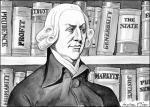 Epiphany 4B
Epiphany 4B
Scripture text: Psalm 111 and Mark 1:21-18
This is Joe. Joe is very happy these days. In fact, you might listen to Joe these days and think he’s gone mad. This usually even-keeled guy who speaks with measured words is sharing his deep joy with the world. There is a backstory. He got engaged.
Psalm 111 begins with the words: Praise the Lord. This imperative in the Hebrew is where we get the word Hallelujah. To hallal the Lord is to offer foolish praise. Abandoned gratitude for what God has done.
So here we have a call to praise God with abandoned gratitude, foolishly, with our whole heart.
There is a backstory to Psalm 111…
Verse two says, Great are the works of the LORD, studied by all who delight in them. We hear that God is gracious and merciful…just and true. But what are the works of the LORD? This text provides clues to the works of the LORD.
 Verse five speaks to the close connection between bread and covenant. He provides food for those who fear him; he is mindful of his covenant. But what is the relationship between food and covenant…between bread stories and doxology?
Verse five speaks to the close connection between bread and covenant. He provides food for those who fear him; he is mindful of his covenant. But what is the relationship between food and covenant…between bread stories and doxology?
It is sometimes difficult to remember that God is the source of bread. We live in a world that tells many stories about bread. Powerful stories that come to us through the media, institutions and ideologies.
We are told that we will get bread if we are smart enough or pretty enough. If we work hard and are successful we can own the bread factory, or a chain of bread franchises. It is even possible to pastor churches and write best-selling books that legitimate the bread stories of culture.
Others tell us the system is rigged and the only way we can get bread is by hustling on the streets, or hoping for a government bread program.
Either way, when we buy into these other bread stories, we will likely have diminished time and energy for doxology. When we are situating our lives in other bread stories, even when we do show up in the congregation, our acts of praise are likely half-hearted.
But we hear the psalmist emphatically abandoned to doxology with God’s people because the psalmist knows the backstory. So what is the backstory to doxology?
The backstory is that despite what Adam Smith or Karl Marx may teach us, the powers are not the source of bread. The biblical story tells us that the God we worship is the creator of all things. God is the source of bread.
the God we worship is the creator of all things. God is the source of bread.
The backstory is that we do our own thing and there are consequences—hardship, struggle, death. But God does not give up on the work of creation. In fact, God establishes covenant with Abraham to make a people who will share their bread with others and be a blessing to all the nations of the earth.
In the same chapter in which we read about the call of Abram, we also read that Abram has to go down to Egypt to find food because the famine was so severe (Gen 12). We learn early on in the biblical story that Pharaoh always has food. There are natural resources—the Nile River—that make it so, but there are other reasons. Pharaoh controls the military and the infrastructure of production. And so Pharaoh always has wealth and power. Continue reading

